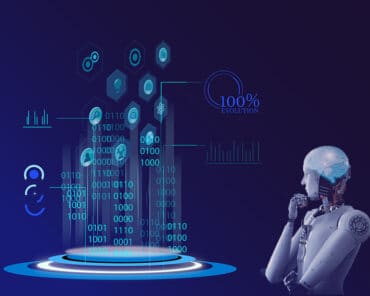
Organizations that view data as a critical corporate asset and embrace generative AI throughout the data lifecycle will position themselves at the forefront of innovation.
In an era where organizations thrive on the lifeblood of data, the imperative to navigate the data lifecycle with precision and efficiency has never been more crucial. As we traverse from data discovery to consumption, Artificial Intelligence (AI) emerges as a transformative force, reshaping foundational data management. This article, an extension of insights previously shared in a prior article, delves into the profound impact of generative AI across every facet of the data lifecycle.
In the creation of enterprise data, generative AI takes the spotlight, pushing the boundaries of automation to new horizons. Beyond conventional data capture, it introduces innovative approaches by utilizing natural language processing and machine learning to intelligently generate data. This paradigm shift not only reduces reliance on manual input but also preemptively addresses errors, ensuring strict adherence to business rules. Consequently, organizations propel forward in their pursuit of efficiency and accuracy, empowered by generative AI’s ability to craft intelligent data autonomously.
Distinguishing between AI and Generative AI becomes crucial. While traditional AI excels at performing specific tasks based on learned data, Generative AI goes beyond creating entirely new outputs across diverse domains. Unlike traditional AI’s proficiency in pattern recognition, Generative AI excels at pattern creation, utilizing data to generate innovative and unprecedented results.
Following the data creation phase, generative AI seamlessly transitions into the data storage stage, continuing its transformative role by understanding and adapting to evolving data patterns. It enhances integration, cleansing, and data quality processes, ensuring the establishment of secure, organized, and well-governed repositories. The advanced algorithms contribute to real-time visibility into business operations, allowing organizations to promptly act on opportunities and address areas for improvement. Moreover, generative AI extends its influence by not only identifying data patterns but also aiding decision-making and developing schematics for new data storage capabilities.
See also: Improve Data Lifecycle Efficiency with Automation
The Role of Real-time Data
Real-time data ingestion, a pivotal step in maximizing data value, receives a significant boost from generative AI. Leveraging sophisticated algorithms, AI facilitates the movement of diverse data sources with unparalleled speed and precision. Generative AI further plays a crucial role in data cleansing, identifying and correcting anomalies, standardizing formats, and assisting in deduplication. Additionally, it contributes to data mapping and transformation by understanding and generating rules and synergizing with Lambda Architectures to accelerate data ingestion. This enhancement in operational decision-making is further augmented by maintaining data quality throughout the process.
In the consumption phase, generative AI takes center stage, propelling Business Intelligence (BI) to new heights. Self-service BI tools, powered by augmented analytics, advance further with generative AI’s ability to derive valuable insights from complex datasets. It aids in data profiling and generating descriptive summaries, statistics, and visual representations. Furthermore, generative AI supports clustering, classification, and data visualization, generating various visual representation formats to aid users in interactively exploring patterns, relationships, and trends. This maximized speed and reliability in machine learning delivers near-real-time business information. Augmented Data Analytics, empowered by natural language processing, extends the value of an organization’s data foundation, ensuring actionable intelligence is both insightful and immediately accessible.
See also: Responsible Generative AI Consortium Established
The Role of Generative AI in Data Creation
Another significant area where Generative AI shines is in actual data creation. Based on developed rules, the availability of code, and other parameters, Generative AI can be harnessed to create massive amounts of data. This capability is invaluable for stress testing applications, testing hypotheses, and ensuring comprehensive testing of every branch of an application, ultimately elevating the quality of the end product.
GenAI disrupts traditional notions of data archive, purge, and destruction by evaluating the usefulness and cost-effectiveness of data through adaptive algorithms. This intelligent process challenges conventional approaches, ensuring compliance with data retention regulations and considering data privacy from GDPR/CCPA perspectives. Generative AI autonomously manages archival and purging, minimizing the need for human intervention.
Seamlessly integrating generative AI into each phase of the data lifecycle enables organizations to reap substantial benefits. By liberating human intervention for strategic endeavors, potential errors associated with manual data handling are reduced, enhancing efficiency and resulting in a superior data product. The inherent time and cost savings position generative AI as the backbone of a holistic data automation strategy, diminishing reliance on IT and empowering employees to focus on tasks demanding human ingenuity.
A Final Word
As we navigate the ever-evolving data management landscape, the integration of generative AI emerges as a defining factor for success. Organizations that view data as a critical corporate asset and embrace generative AI throughout the data lifecycle position themselves at the forefront of innovation. The journey toward data modernization reaches new heights as generative AI becomes an integral ally, revolutionizing how we discover, consume, and derive value from our most precious asset—data.
To harness the full potential of emerging technologies across the data lifecycle, organizations are urged to collaborate with professionals who not only understand but deeply appreciate the value these innovations bring. Seek out experts versed in the intricacies of GenAI, individuals who can navigate the complexities of its integration and capitalize on its transformative capabilities. Embrace the future by leveraging the expertise of those who can unlock unprecedented efficiency and precision, propelling your organization to new heights in the data-driven landscape.




























